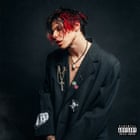Dominic “Yungblud” Harrison gives a good interview. He talks passionately about hot-button issues: gender fluidity, transgender rights, mental health. He peppers his conversation with attention-grabbing, self-aggrandising soundbites: “I’m everything that people hate.” “I’m more of a preacher than I am a musician.” “I am a vehicle for other people’s expression.” He admonishes “BBC Radio 6 Music dads” and hymns his fans as “an army based on a foundation of truth and need and trauma”. Among his most striking pronouncements was something he said to the Guardian in 2020: “If you know Yungblud” – Harrison has a habit of referring to his onstage persona in the third person – “the music is secondary.”

It was a comment that Harrison’s detractors, whose number and vociferousness is perhaps an unavoidable consequence of saying things such as: “I’m more of a preacher than I am a musician” whenever a journalist is in earshot, leapt on with relish. Formerly an actor in Disney teen drama The Lodge, Harrison has long been dogged by questions about his legitimacy as an avatar of punky rebellion. But you could take it as a frank assessment of pop success in an age in which social media engagement is deemed of paramount importance, or an admission that his fans, who call themselves the Black Hearts Club, are as attracted to him because of how he looks and what he says as much as how he sounds – which, as an analysis of how pop fandom works, seems fair enough.
Or you could take it as an honest disclosure that music is the least well-formed aspect of what Harrison does. Certainly, his approach has swerved about over the last four years. His first mixtape, 21st Century Liability, proposed him as a kind of Ed Sheeran in eyeliner, offering a more angsty, Yorkshire-accented take on the old acoustic guitar with hip-hop-influenced beats and vocal delivery. His follow-up album Weird! seemed linked to the pop-punk revival. And to add to the 00s throwback feel, a hint of Britpop 2.0’s less lauded practitioners – the Fratellis and the Automatic – occasionally lurked around its contents.
Weird! entered the charts at No 1 but fell out of the Top 30 the following week: a dead giveaway of an artist with a sizeable and committed fanbase but little wider appeal. You get the feeling that is a situation Harrison is keen to rectify on his eponymous follow-up. The distorted guitars still chug along but they’re aligned to choruses built to fill the arenas Harrison is scheduled to play next year – and indeed to be heard beyond their confines – as well as synth hooks and clipped new wave beats that bear the influence of the Weeknd’s Blinding Lights. The bratty, nasal sneer of Harrison’s vocals – very much an acquired taste – has been toned down slightly, as has his accent: he occasionally lets fly with something audibly rooted in South Yorkshire, as on Don’t Feel Like Feeling Sad Today, but more often it pitches itself towards the middle of the Atlantic.
Leaving aside the fact that if you offer a more pop-facing take on pop-punk you’re inevitably going to sound like Busted at some point – and you can definitely imagine the 00s boyband gurning their way through The Funeral – most of the music is really well done. If the shift into heavily Auto-Tuned vocals and electronics on I Cry 2 feels a step too far – there really is an awful lot of that kind of thing about at the moment, and you wonder whether we need any more of it, vociferous defence of Harrison’s pan-sexuality in the lyrics or not – even a BBC Radio 6 Music dad might be forced to concede that Tissues or Memories (the latter boasting a guest vocal from Willow Smith) represent bulletproof pieces of pop songwriting.
But it is curious how much the lyrics – which are central to Yungblud’s outsider appeal – veer, qualitatively. Harrison can write potent and witty lines: “Masculinity seems to hurt a lot the first time you feel it in your jaw” is a snappy way to describe being punched. “Art is dead, killed by information” is an equally snappy, if bleak, assessment of social media’s effect on popular culture. But he’s also capable of dishing up stuff that’s teen-poetry trite: he’s totally worked out that “heroin” and “heroine” sound the same, while Don’t Feel Like Feeling Sad Today finds him asking: “why are we sitting in silence, wondering how we can beat all the violence?” Sometimes he’s genuinely affecting – as on Sex Not Violence’s exploration of gender – and sometimes he’s clumsy to the point that you find yourself begging his pardon: can you show signs of weakness asymptomatically?
Perhaps that’s part of the appeal to his “kids”: in an era when we’re told #relatability trumps everything, maybe they want to hear stuff that sounds like it could have been ripped from their own private journals, howlers and all. Or perhaps it’s an indication that – for all his bullishness in interviews, and his latest album’s confident sonic step forward – Yungblud is still very much a work in progress.
This week Alexis listened to
Yazelles – Sugar Low
Currently to be found on SoundCloud: horns, sirens, ragga vocal samples – peak-time, edge-of-panic house music.
Stay connected with us on social media platform for instant update click here to join our Twitter, & Facebook
We are now on Telegram. Click here to join our channel (@TechiUpdate) and stay updated with the latest Technology headlines.
For all the latest Music News Click Here
